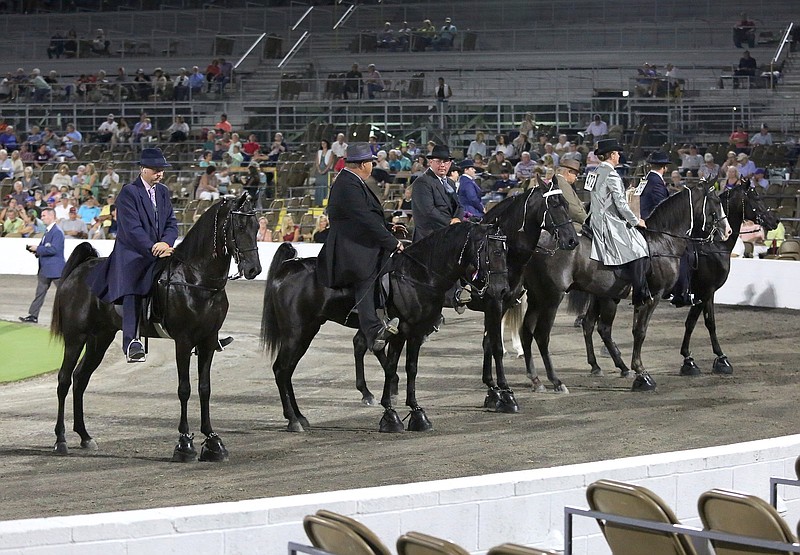Saturday night in Shelbyville, Tennessee, 96 miles northwest of Chattanooga, some sore horse will likely be named the 83rd Tennessee Walking Horse world grand champion.
We say that horse will likely be sore because, sadly, many of trainers competing in the Tennessee Walking Horse National Celebration championship show year after year have long records of violating the Horse Protection Act, a law passed 51 years ago to end the cruel and painful practice of soring.
But as we've said before, the law has loopholes so big a herd of horses are regularly run through it.
Most of America was introduced to walking horse abuse in 2012 when undercover video aired on prime-time television offering a glimpse into the barns and training methods, known as "soring," of former Hall of Fame trainer Jackie McConnell. The video resulted in McConnell's and others' eventual guilty pleas and federal convictions in Chattanooga and Nashville courtrooms.
The industry claimed McConnell was just one of a few "bad apples, but in an apology video that McConnell later made as a condition of his probation, he acknowledged that "soring abuse is widespread in the industry." USDA inspectors later reported that federal testing in the final days of the 2012 Celebration revealed 145 horses out of 190 - 76% - tested positive for prohibited foreign substances used in soring.
Five years later, in September of 2017 just hours after Shelbyville trainer Bill Callaway won the Tennessee Walking Horse World Grand Championship, his trainer license was suspended for eight months for violating the federal Horse Protection Act. He also was fined $1,100 by the U.S. Department of Agriculture. Here's the kicker: The suspension stemmed from a complaint filed in January, and Callaway told the Shelbyville Times-Gazette he couldn't afford to fight the case so he apparently made a deal with USDA and was allowed to compete in that world grand championship before his license was pulled.
A similar deal apparently was made before the 2019 show when a dapple gray named I'm Mayhem became the World Grand Champion Tennessee Walking Horse. The horse's trainer and rider, Rodney Dick, was allowed to train and show the horse despite the fact that nine months before, the USDA had found him in violation of the Horse Protection Act and set his 18-month suspension to begin on Oct. 1 - a month after the show.
Soring is treating a walking horse's front legs with burning chemicals and/or objects hidden beneath and around the heavy pads or stacks bracketed to their hooves. With the continuing use of these immoral training methods, the graceful rocking gait of Tennessee walking horses became the uneasy lurch of the "big lick." The horses flail their legs in the air to avoid putting sore hooves on the ground.
It doesn't have to be this way. The first world grand champion named in 1939 was a flat-shod horse called Strolling Jim, whose graceful natural gait made walking horses famous long before the ugly "big lick" became a disgraceful norm.
It also doesn't have to be this way because our lawmakers don't have to let it be. Each year since 2012, a bill to toughen the Horse Protection Act has been introduced with scores of sponsors. Yet the bill languished with no vote until 2019 when the House passed it 333-96. Still, it died a no-vote death again in the Senate. Sure enough, the Past Act, as it's known, is out there again, and it still can't get a vote? What's wrong with these people?
And it doesn't have to be this way because the animal groups that fight walking horse abuse don't have to fight petty turf wars and compete with one another over compromises and rulemaking. For example, the Animal Wellness Action, convinced that Congress would not pass the PAST Act, worked for a 2020 compromise bill with the industry that would eliminate hoof chains and allow a 60% smaller and removable shoe than those used today, while also increasing penalties and eliminating the industry self-policing.
But the Humane Society of the U.S. came out solidly against the compromise, saying it will continue to push for passage of the tougher PAST Act and try to get the USDA to reintroduce the 2016 federal rule scuttled by the Trump administration.
These are two powerful animal advocacy groups that should put their differences and competing fundraising goals aside and work together to get these horses protected.
It doesn't have to be this way because the USDA could get off its duff and reintroduce that shelved 2016 rule - something that should be an easy decision for the Biden administration since, during the Obama administration, the rule received over 100,000 supportive public comments, including bipartisan letters signed by 182 U.S. representatives and 42 senators. Obama's USDA submitted the rule for publication in the Federal Register, but it wasn't printed before Trump took office, leaving it to become one of the many regulatory changes that were frozen.
And, it doesn't have to be this way if USDA would stop making deals with trainers that allow them to keep showing horses every year at the championship show before they begin their paltry suspensions.
Finally, it doesn't have to be this way if civic groups like the Woodbury, Tennessee, Lion's Club wouldn't choose big lick walking horse shows as their primary fundraisers. Or, if they must, they should specify that only flat-shod walking horses may enter. Until then, show goers and horse lovers don't have to support these tainted big lick industry shows.
It doesn't have to be this way. Won't somebody pay attention?
